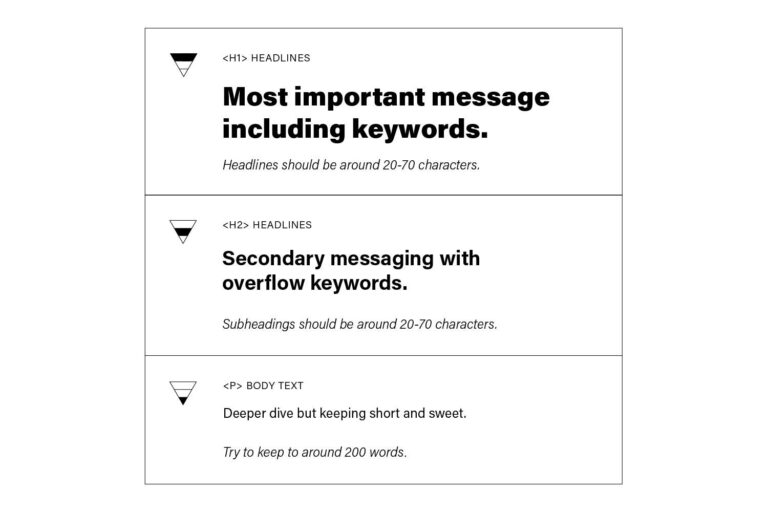How to write great content for your company website
8 min read

Not everyone has the budget to employ an agency or a freelancer to write their website content for them, and we completely understand that.
What we also know from first-hand experience is that for a lot of businesses, it’s a mammoth task alongside all other day-to-day projects and endless checklists.
7 simple tips to writing website content that performs for your employees, your customers and SERPs
We write a lot of content for our clients, and some like to write content for their websites themselves. We take a content-first approach to digital projects, which means that, before designing a website, we expect a lot of (if not all) website content from our clients.
You might ask why, and that’s a very fair question. When we start a new website project with a client, we undertake a strategy & planning meeting, which is followed by Prototyping & User Experience (UX). What’s that when it’s at home, then?
Part of the UX process is the creation of a clickable wireframe of a website’s site map. Each page is clickable and outlines the objectives, goals, content requirements and a call-to-action. That then makes it easier for content writers to understand exactly what’s needed from them. It’s like a visual checklist for a content writer to work through to ensure they're catching all the requirements for a user to make their journey.
So, when a client supplies us with all of the content (both written and photography, etc) we’re able to move to digital design and create beautifully bespoke layouts and experiences that follow the desired customer journey, and make the most out of the content to drive conversions.
However, before we move onto our tips, here are a few resources I’ve personally collected that I find super helpful for writing content.
7 tips for killer website content for all businesses
Ensure you're writing for the web, not print
There’s a stark difference between writing for print and writing for the web. In my experience, a lot of businesses think they can use the same content from a brochure digitally. I’m afraid to say that’s not the case, and please don’t.
Website copy needs to be in easily scannable chunks and succinct but to the point. Long, rolling sentences with endless commas betwixt isn’t the way to go. Think short and snappy. People don’t spend time reading blocks of content online. They digest information quickly and move on. All the key facts, points, directions and actions MUST be at the beginning of your copy and content. Here's a handy infographic to keep you on track with messaging focus and length.

Always make it human
When I say short and snappy, that doesn’t mean robotic. Many businesses get lost on the idea of SEO and keywords, and whilst they’re important, they’re not the priority - writing for a human is. Your customer. If content is illegible because it’s stuffed with keywords, then a person will simply navigate away. Wouldn’t you? Write with keywords and phrases in mind, but don’t let them dictate your writing. You can always edit later and add in those extra few words to climb the SERPs.
Keyword & SEO (Search Engine Optimisation) research
Let’s talk about keywords and SEO, too. Google (let’s be honest, most of us only use it as our primary search engine) is incredibly intelligent. It’s smart enough to know when a website is keyword stuffing or simply writing for SEO, so the simple answer is, don’t. Great organic content will perform far better over time than stodgy, unfeeling sentences. Google will penalise you for duplicate content, keyword stuffing and robotic, unhuman-like copy, too.
When you’re writing content for web pages, never fail to consider what your meta title and description are going to be. A meta title boosts SERP rankings and should be considered with care, so think about what your customers are going to type into search (their search intent) when they’re looking for something. When it comes to meta descriptions, whilst they don’t have any weight with SEO, they’re more likely to persuade people to click.
How to angle your content
Don’t blow your businesses, services, or products' trumpets! Whilst you might be the best, don’t simply state it - tell people why! Give them the answers to their questions, the solutions to their pain points, and the benefits of your service or product for them. Why is your business going to be the answer to all their prayers, so to speak. Explain but don’t tell people how to suck eggs. Prove to them why you and your business are going to make a difference to them and theirs.
Provide added value to your customers with your content
Give something away for free and not because you expect something in return. Maybe it’s a resource (like this article and its resources), a template, a guide or a white paper - or a promise! We make a point of going above and beyond as an agency, and that’s just something we do. We don’t tell our clients; we don’t track every last minute of extra time. It’s important to do your very best work, and if that means taking a hit, then so be it. There’s a lot of value in caring about something as much as your customers, and getting that across in your website content is important. You’re not just a business or a supplier but a partnership.
It’s worth considering where content might link with other content on your website (page relationships) at this stage, too. For instance, I might write an article about Craft CMS (what we use to develop websites) and, within the content, link to key articles useful to customers. That way, you can seamlessly add information into content for a better user experience. Just make sure that when you link them on the website, you ensure they open in a new window or tab!
Know and understand each web page’s goal
Many agencies (including us) who work to achieve the best possible results for a website will go through stages of workshops, prototyping and user experience mapping with our clients. At the end of that, it’s very clear of what each and every goal of a page is on a website and what that page needs to do - not a single page is simply a ‘filler’ or just there for SERPs. They all have an objective and a goal to achieve. If your agency isn’t working with you to do this, then consider a few key points when you're considering page content yourself.
- What is the page’s core goal?
- What audience/persona is the page targeting?
- At what stage of the buying cycle does the page represent?
- What are the benefits and solutions you are communicating?
- What is the key call to action the audience must take?
- What keywords and phrases must be included?
Call to action (CTA) on each page
If you’re not familiar with the term (and don’t worry, not everyone is!) then a call to action simply means what action you would like a customer to take on the web page they’re on. For instance, on this page, at the end, I’d like you to sign up to our newsletter (wink wink nudge nudge) or if we’re super lucky, start a project with us. It’s the final goal of the page - to convert a customer or move them onto further pages that might continue to build their interest in your company or the services you offer.
It could be to fill out a form, call, email, download a PDF, pop in for a visit, buy a product, request a quote - there are all manner of end goals. And if you really want to keep close track of them - here’s another tip - set up some goal conversions and events in your Google Analytics to keep track of the ones that convert the best.
That about sums up my tips for writing great content for your website, but most of all and most importantly, consider your audience above all else. Take your time to consider what they want to know and hear, base it on fact and analysis and not on assumption. For many brands and businesses, a website makes the very first impression and it's key to come across as personable and knowledgable. Don't worry so much about how it'll look on the page, that's what a designer is for, they'll take great content and present it to a customer for them to make their journey around a website with ease.
Although, writing website content isn't for everyone and that's not a bad thing. It can be a labour of love for some and a tedious chore for others! If you fall into the latter or simply don't have the time or resource to be able to work on website content in-house, get in touch and we'd be happy to discuss how we can help bring your vision to life with the written word.
20 years of Abstrakt - what changed, what didn’t, and what’s next.
5 min read

Our 2025 client feedback is in - and the results speak for themselves
3 min read

Why B2C brands love Shopify: the pros and cons
4 min read

